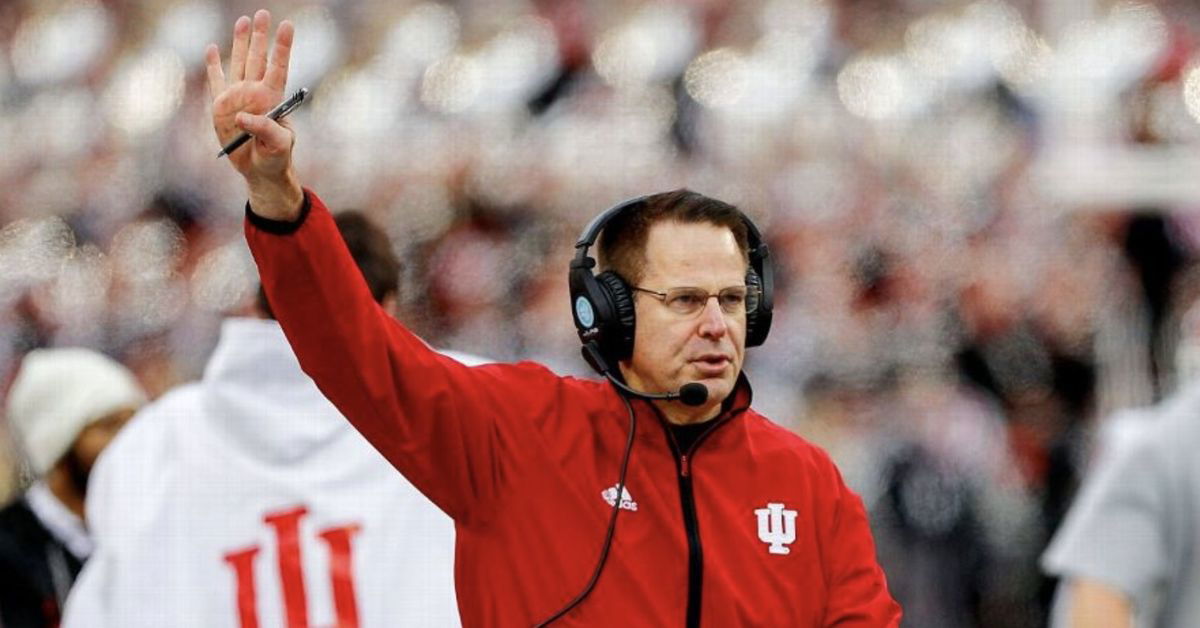
Imago
Curt Cignetti’s Indiana have been on a tear this season, with a 6-0 start. Credits: Curt Cignetti Twitter

Imago
Curt Cignetti’s Indiana have been on a tear this season, with a 6-0 start. Credits: Curt Cignetti Twitter
Curt Cignetti came to Indiana just last season and in just one year has led the team to an 11-win season along with a playoff berth. To put into perspective how momentous the feat was, the last time Indiana started 4-0 in the season was back when Bill Belichick’s father was still playing college football. And mind you, Belichick is 72 years old himself. Now, despite this momentous feat and having achieved only the third winning season for Indiana since 1994, Curt Cignetti is making headlines for all the controversial reasons.
Watch What’s Trending Now!
Right from declaring “Google me, I win” to reporters when asked about his coaching philosophy, to challenging giants like OSU and Michigan in his introductory conference. Curt Cignetti has always managed to find his name on the back page headlines in Bloomington, Indiana. And now, after the season has ended, after heavy scrutiny about Indiana’s non-conference schedule, Curt Cignetti has instead turned to adopt an SEC scheduling philosophy.
“Here’s the bottom line, okay, we picked up an extra home game, and we play nine conference games. The two best conferences in college football, any football guy that’s objective will tell you, are the Big Ten and the SEC, all right — 12 of the 16 SEC teams play three G5 or an FCS game. All right? So we figured we would just adopt SEC scheduling philosophy, you know,” said Cignetti when asked about weaker non-conference opponents. But is this philosophy sustainable in the long term for Indiana?
ADVERTISEMENT
According to the CFP executive director, Rich Clark, the teams favoring weaker teams in non-conference games might not have the advantage as they would like to think. “The committee looks at games, every game, whether it’s conference or non-conference, as quality of wins and quality of losses. So, if you’re playing a really big team, a really great team with a high strength of schedule, and you beat them, you’re getting huge amounts of credit,” said Clark as he sat on 99.9 ‘The Fan’ podcast. But that’s not it.
The CFP director also clarified that scheduling games against stronger non-conference opponents won’t be too detrimental for teams, even if they lose. “If you lose to them (big teams), though, you’re not going to lose that much because you put it out there and you went and you fought a really great team,” said Clark. Now, coming to Indiana’s schedule, it has had its valid criticisms lately.

Imago
Dec 20, 2024; Notre Dame, Indiana, USA; Notre Dame Fighting Irish head coach Marcus Freeman leads the team onto the field before a first round playoff game against the Indiana Hoosiers at Notre Dame Stadium. Mandatory Credit: Trevor Ruszkowski-Imagn Images
Last year, the Hoosiers played the 3 non-conference games against Charlotte, Western Illinois, and Florida International. All these teams are extremely weak opponents, which showed in the results last year, and even Indiana’s conference schedule wasn’t without its criticism. In that, they played teams like Ohio State but avoided Penn State, whereas teams like Michigan, Nebraska, and Washington themselves struggled last season. Now, coming into the 2025 season, the same Cignetti’s SEC philosophy is again playing out.
ADVERTISEMENT
ADVERTISEMENT
Rich Clark dismisses the Indiana Hoosiers’ scheduling model and cautions against it
In the 2025 season, Indiana faces Old Dominion, Kennesaw State, and Old Dominion, which is altogether an FCS team, intensifying the criticism for Indiana’s selection in the CFP last year. The voices have also grown since the Hoosiers in 2023 canceled their partnership with the Cardinals, whom they would have faced in 2025 in place of Kennesaw State. On top of that, the team also had canceled their partnership against Virginia to play games and instead agreed to pay the six-figure buyout. But are these decisions prudent?
Top Stories
Patrick Mahomes’ Dad Faces 10-Year Prison Sentence After Chiefs QB’s Father Reportedly Violated Probation Terms

Prayers Pour In From Jordan Love & Co. as Cowboys Star Mourns Tragic Personal Loss

Justin Jefferson Makes Final Decision on Joining Buffalo Bills After Further Damaging J.J. McCarthy Relationship

Matthew Stafford Makes Final Decision on Retirement After Narrowly Beating Drake Maye For NFL MVP

Multiple PGA Tour Pros Stopped from Playing as WM Phoenix Open Round Is Canceled Over Recurring Problem

PGA Tour Split Into Two as Scottie Scheffler Confirms Stance on Patrick Reed’s Return

According to Rich Clark, there’s no upside in playing weaker non-conference opponents, as he signaled coaches against doing that. “If you play a weaker team or they have a lesser strength of schedule and you beat that team, you’re going to gain something, but your gain is not going to be as much. But if you lose to that team, you stand the risk of losing a lot,” concluded Rich Clark.
Last year, Georgia faced Clemson and Georgia Tech in their 4 non-conference games. Moreover, Alabama had Wisconsin as a power opponent on that 4 non-conference slate. Still, since the SEC has 8 conference games, the last three games they play against non-conference opponents are usually against G-5 or FCS teams. Which begs the question: Is Indiana being blamed unfairly? Probably not!! Scheduling G-5 teams and FCS teams is one thing, but if a team that calls itself a playoff contender fears Virginia? They probably shouldn’t be in the playoffs.
ADVERTISEMENT
ADVERTISEMENT
ADVERTISEMENT
ADVERTISEMENT
.png)
.png)
.png)



